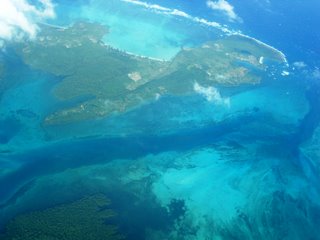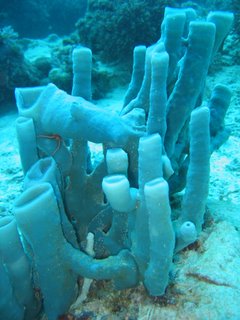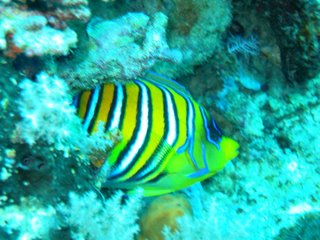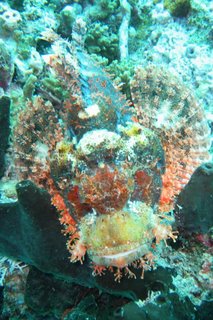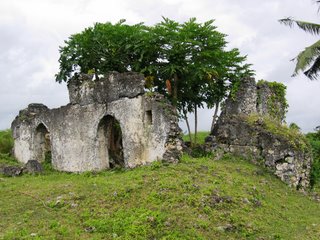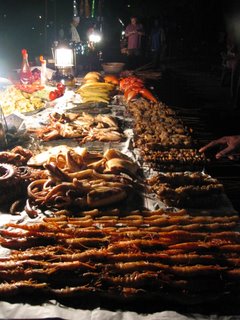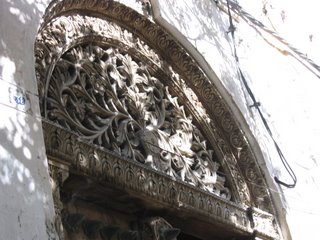After a relaxing day on Lake Victoria at Uganda’s only near-olympic size swimming pool on Saturday, I spent Sunday white water rafting on the headwaters of the Nile.
(The pool was built to be the first Olympic sized pool in this part of Africa, thereby allowing the resort that houses it to host international events, gain notoriety, turn a profit… But alas, due to the usual developing world attention to detail, the pool turned out to be two inches short. And was thereby relegated to being a “near-olympic-sized” pool, catering to Kampala’s well-healed ex-pat population.)
And now, without further ado, the death-defying part. I got up on Sunday at sunrise and boarded a bus filled with hung-over tourists and headed to the headwaters of the White Nile. Way up here the water is clean enough to swim in and wild enough to have one of the world’s highest concentration of class-five rapids.
We got to camp and picked out our equipment, lifejacket, helmet and paddle. The river guide was a Kiwi (New Zealander) kid that had thick blond dreadlocks and an expression that mad it clear that be believed himself impervious to drowning. He asked us to sort into three boats, regular, crazy and death-wish. I was one of the first ones in the death-wish circle.
He explained us to the basics of rafting, which basically consisted of forward paddle, back paddle, and swim if you find yourself in the river. AND DO NOT LOSE YOUR PADDLE if you get dumped. People are free to make more of, paddles cost money. We did a practice drill of flipping the boat in the still water, because he said that on average the boat will go over two or three times during the course of the day. (Yeah, we went over three times before lunch.) The drill was a little scary as I got stuck under the boat, and that was in still water. The guide told us not to panic if we find ourselves in the river. Just grab your lifejacket and count to five and you will be on the surface. Then swim to the boat, wait until still water, wait until the boat is flipped back over, climb in and do it all again.
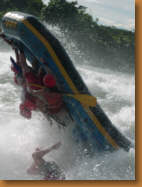
So off we went. Through the rapids, laughing, screaming, getting soaked, getting tossed as the boat flipped. It was really good fun. Getting tossed is like getting caught in a wave when you are swimming in the ocean. You know when you don’t dive deep enough and get washed ashore… (I know this because Dad was really into bodysurfing when we were kids. I would go out into the waves with him. Six foot waves, six year old child, what could go wrong?) If you live in a landlocked place, or aren’t familiar with getting caught in a wave, just climb into an ordinary household washing machine and put it on the “SuperWash” setting.
The picture isn't me. They wanted $30 for a CD of the pictures of me drowning. The picture is the one they put on their promotional material. They are going for a certain type of client.
On the third time we went over, we flipped at the start of a long string of rapids. I was in the water, one… two… thr… pop! Back on the surface. I opened my eyes just in time to see the wall of water crashing on top of me, one… two… three… pop! This time I got two gasps of air before BANG, back down I go, one…two… three… four… Anytime now… Seven… Uh-oh. Eight… Hmm, better open my eyes to investigate… nothing but brown water… that’s not good (surface water is white)… ninetenele… pop! Gasp! Dunk! One… two… three…
This continued until I washed into the still water. I was heaving and exhausted when the safety kayak caught up with me. Boy was I glad to see him. He asked for the paddle that I had doggedly held on to for this entire ordeal. Then pointed and told me to swim for the boat. Upon getting back in, another rafter which had taken a similar trip down the river asked about drinking the water, because, like me, had just ingested a couple liters. Guide responded, oh man, don’t want to do that, that’s dangerous.
We flipped over once more during the course of the trip. Eventually an older woman in the boat (a horse trainer from Canada with, inexplicably, a diamond implanted in her left front incisor), asked the guide to stop flipping the boat. Chicken. Man, I hope I am not that yellow when I get into my 30s.
We got all the beer we could drink on the endless bus ride back to Kampala.
Other than that, I am living the quiet ex-pat economist life here in Kampala. I have a room at a guesthouse at the local university. I take a moto-cab (glorified moped with an extra seat attached to the back) to work. Because I am always in a skirt, I ride like the African women do, sitting sidesaddle, ankles crossed hanging over traffic and my laptop balanced on my lap. The way that most of these guys drive, zig-zagging through traffic moving rather in indiscriminant directions, all in all, my daily commute is probably more dangerous than the rafting trip.
